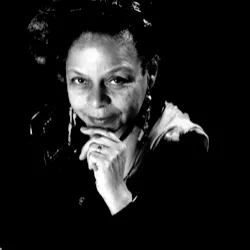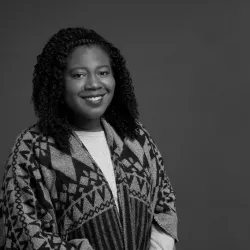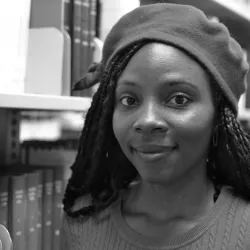Black History Month 2022
History Being Written, Now and Forever
Once again this year, the Pierre Elliott Trudeau Foundation is pleased to mark such an important month honouring collective memory; an entire month to celebrate true history, all history—that of the past, that of the present, but also that which is still unwritten. A month that is unique, multilayered, and textured with the richness of experience of the African diaspora. A moment to underline Black people’s social, cultural, intellectual, political, scientific, technological, economic, artistic and heuristic contribution to the evolution of our society and societies, here in Canada and all over the world.
Black History is written, at home and around the world, by prominent figures of the past like Rosa Parks, Daniel Hale Williams, and Martin Luther King. Closer to us in time, we underline the accomplishments of present-day figures like award-winning 2011 Mentor Rita Shelton Deverell.
Rita Shelton Deverell, the next chancellor of Lakehead University in Ontario, is someone who knows that Black people must resolutely continue to take their rightful place. Her incredible journey and eloquence will leave a legacy for future generations, on home soil and around the world. Like many other prominent Black figures long before her, Rita Shelton Deverell has paved the way for remarkable individuals who are increasingly being noticed for their contribution to the democratization of knowledge; individuals like Chanelle Robinson (2021 Scholar), Bryon Maxey (2021 Scholar) and Lydie C. Belporo (2021 Scholar). They are the scholars of today and tomorrow. Because this history is certainly the story of people who have marked the past and continue to influence the present of our societies; but it is also that of people who will read and continue writing this splendid narrative, which encompasses all the hope and talent of the world.
In this month celebrating Black History, the Pierre Elliott Trudeau Foundation is proud to showcase the research and contributions of Scholars, Fellows and Mentors who brilliantly embody the various academic, social, and professional experiences of Black Canadians, in Canada and around the world.
Among the topics covered by Pierre Elliott Trudeau Foundation Scholars are womanist theology and diasporic poetry in a Canadian context, secular intellectual and cultural heritage of Black people, governance of violence and prevention of radicalization and extremism, to name a few. These Scholars are curious, generous, plural, inclusive, and brilliant minds. Their vision extends far and wide, for themselves and for others. They will continue to grow and spread their knowledge, even more so in the second month of every new year to come.
RITA SHELTON DEVERELL
CELEBRATING BLACK HISTORY AND FUTURE
Rita Shelton Deverell, C.M., Ed.D., 2011 Mentor, will be Lakehead University's first-ever chancellor of colour when she is installed as the university’s 10th chancellor at the 2022 convocation. The twelfth holder of the Nancy Chair in Women's Studies at Mount Saint Vincent University, she is also a theater artist, director, and television producer, and was also the first woman to head a journalism program in Canada at the University of Regina's School of Journalism. Innovative, creative, award-winning, and an inspiration to audiences and younger generations, Rita Shelton Deverell was one of the first black women in Canada to hold a position as a television host and network executive.
“Of course, we know that Black people have been in Canada since the 1600s. Don’t we?
We know that is not since time immemorial, like Indigenous peoples, whose territories we occupy, but 400 years is a good long time. And we know that the contributions of Black people in those 400 years are to be celebrated along with others who have been on Turtle Island only 400, 300, 200, 50, 10, or 5 years. Don’t we?
We know that Black History Month was declared officially in Canada 26 years ago by the unanimous approval of a motion by The Hon. Jean Augustine, the first Black Canadian woman to serve as a federal Minister of the Crown and Member of Parliament. Jean is also a strong, supportive role model for me, Lakehead’s first chancellor who is a woman of color, and to all who strive in the world of education. She is a former teacher and principal.
Some of my colleagues greatly prefer “Black Futures Month.” This year’s Heritage Canada theme captures the spirit: “February and Forever: Celebrating Black History today and every day”
We need both, the history, and the future. For those of us in this community the time is now, to celebrate the contributions of the last 400 years. To be glad that a campus such as Lakehead Orillia is in Simcoe County, named for Lieutenant Governor John Graves Simcoe who passed the Act Against Slavery in 1793, aimed at ending the sale of slaves by Canadians to Americans. The act also liberated slaves entering Upper Canada from the US but did not free existing adult slaves already in Canada. Not enough, but up to us to finish the job of liberation, of equity, diversity, and inclusion.
In this Black History Month, I especially salute the Lakehead community, which includes 70 international nations as well as many indigenous Nations. We are all responsible for the future of Black people this month and every month thereafter, working and celebrating social justice.”
CHANELLE ROBINSON
EXPLORING WOMANIST THEOLOGY AND DIASPORIC POETRY IN THE CANADIAN CONTEXT
Chanelle Robinson, 2021 Scholar, is a doctoral candidate in systematic theology at Boston College, focusing her research on womanist theology and diasporic poetry in the Canadian context. A recipient of doctoral fellowships from the Social Sciences and Humanities Research Council and the Louisville Institute, Chanelle Robinson is both an educator and researcher, and also serves on the Canadian Theological Society.
“For my research, attending to Black Canadian history means unearthing the stories of Black women who were changemakers, highlighting the multiplicity of Black experiences in this country, and examining the role of the Sacred in these histories. Black history month challenges us to reflect on the parts of Canada’s history that have been forgotten, erased, and misremembered. We are collectively invited to honour and learn from the longstanding history of diverse Black communities on this land.”
BRYON MAXEY
INTERPRETING AND COMMUNICATING THE SECULAR INTELLECTUAL AND CULTURAL HERITAGE OF BLACK PEOPLE
Bryon Maxey, 2021 Scholar, PhD student in Religion at the University of Toronto, teacher and interdisciplinary researcher on Islam and premodern Africa, is interested in building bridges between the Black communities in Africa and the Americas, particularly in the intellectual and cultural realms. To better understand the rich and diverse heritage of Black people, his research focuses on the dynamic and plural history of Quranic interpretation in Africa. As a young researcher, he is greatly inspired by his experiences as a high school teacher and a community organizer in a multi-faith setting. An innovator and humanist, Bryon Maxey has, among other things, created an online Islamic studies program.
“Nearly a century ago—shortly after establishing what became Black History month—Carter G. Woodson outlined a hopeful vision for teaching racial equality that might foster "an appreciation of the virtues of all races, creeds, and colors." This guiding purpose still rings true today in my research to understand a glimpse of the worldviews, epistemologies, and lifeways of premodern Africans, as I seek to elevate, like Woodson, the often overlooked "importance of the African background" of global Black History. From shared African origins, to the modern mosaic of Black communities in global diaspora, Black History has always been characterized by a plurality of perspectives—and this is acutely true in Canada. Publicly appreciating and reflecting on Black History in all its diversity (linguistic, religious, cultural, political etc.) is important within and beyond Black communities because of the sense of mutuality it cultivates for the benefit of current and future generations.”
LYDIE C. BELPORO
THE GOVERNANCE OF EXTREMIST VIOLENCE IN SUB-SAHARAN AFRICA
Lydie C. Belporo, 2021 Scholar, is a doctoral student at the School of Criminology of the Université de Montréal. Co-founder of the International Network of Women Doctoral Students (INWDS), she is actively involved in her field of expertise and was also the coordinator of the UNESCO Chair in the prevention of radicalization and violent extremism in Canada. For her research, Lydie C. Belporo is interested in the trajectories of former recruits of the terrorist group Boko Haram and their reintegration into Cameroon.
"Black History Month is an opportunity to recognize and celebrate the important contributions of Black people in Canada. Education has played a central role in these emancipation journeys, and in this sense, as a person of the diaspora, I am pleased to contribute through my research to the understanding of social phenomena in my field of research. My dissertation topic, which revolves around the analysis of the criminal phenomenon in sub-Saharan societies, allows me to deconstruct certain postulates through a more holistic approach that considers the importance of the weight of history and structural inequalities, in order to have a finer understanding and to better outline the trajectories of exiting violence. It is important to emphasize the plurality of perspectives that exist within the groups to be able to explore the richness of the paths of the people who make up these groups. This state of mind allows us to obtain a broader panorama of reality and to innovate with approaches and methods that are more creative and productive. My research allows me to measure the importance of combining diversity and plurality of perspectives in a context of conflict, where linguistic diversity coexists (French and English speaking populations), and where the involvement of women and youth can contribute to the development of better public policies for peace and security.”





